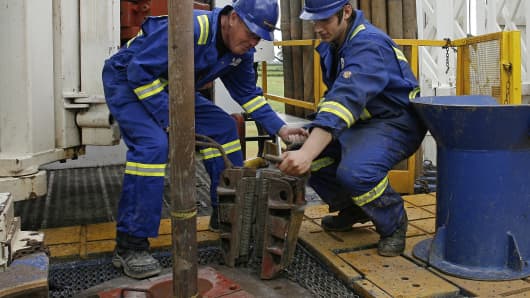Following UK firm IGas' news that a larger amount of shale gas than previously thought may be available in the north of England, the British Geological Survey (BGS) has urged caution.
IGas said there could could be between 15 and 170 trillion cubic feet (tcf) of gas in an area of 300 square miles in the north west of England. It estimated that the most likely amount would be 102 tcf of shale gas.
But Dr. Nick Riley of the BGS said the range of the estimate from IGas showed how unreliable the news was.
"The announcement by IGas of their estimate of a range of between 15.1 to 170 tcf of "Gas Initially In Place"...serves to demonstrate the high degree of uncertainty in calculating the UK shale gas resource even in a relatively small area," Riley said.
"It is vital that significant exploration drilling and testing is carried out in various parts of the UK in order to reduce uncertainty about the UK shale gas resource," he continued. "It is important to realize that a gas resource is not the same as a gas reserve. The shale gas reserve will be a fraction of the resource figure and will be dependent not only on the geology, but also socioeconomic & regulatory factors that affect the ability to produce the gas and get it to market."
(Read More: Shale Gas Could Be UK's New North Sea: Report)
The chief executive of IGas, Andrew Austin, was questioned about why previous estimates from the company were wrong on the BBC. "What's changed is we've reprocessed a lot more data, we've reinterpreted things that we've looked at ourselves and basically we've just got more data that we had previously," he said.
Despite the increase in shale gas estimates, Austin cautioned that only 15 percent of the gas might be recoverable, yet that still should still make the U.K. less dependent on gas imports. The U.K.'s total gas use is 3tcf per year, indicating how even at the lower end of the scale, the shale gas reserves in the country's north west could be hugely important.
IGas shares rose 12.6 percent on Monday, and it followed a string of good news for shale gas exploration in recent weeks.
Britain's Chancellor of the Exchequer, George Osborne, announced in his budget that there would be tax breaks for fracking companies and financial incentives for local communities in shale gas sites. Osborne's announcement came after a temporary ban on fracking had been lifted in December after two earth tremors in Lancashire that some blamed on nearby fracking.
(Read More: A US-Style Fracking Revolution for the UK?)
Obstacles Still Lie Ahead
Austin said proposed drilling would begin in the last quarter of 2013, adding that the company will in "due course carry out further analysis and reinterpretation of existing seismic and subsurface data to evaluate the potentially prospective shale resources in the East Midlands and Weald Basin licence areas."
However, fracking companies face local discontent in some areas over the potential of earth tremors and the environmental impact on the countryside. A grass-roots organization called "Frack Off" is already attempting to mobilize communities across the country.
(Read More: UK Shale Gas Drilling Moves Closer to London)
An April report from the U.K.'s Energy and Climate Change Committee said that not only was it too early to say whether shale gas would bring down energy prices, but it emphasized caution when it came to any shale gas estimates.
"We conclude that it is right for the Government to exercise caution over shale gas estimates given the uncertainty and confusion over definitions. If and when the Government does decide to issue estimates of U.K. shale gas resources it should set a good example and ensure that it is explicit about which definition it is using," the report said.


